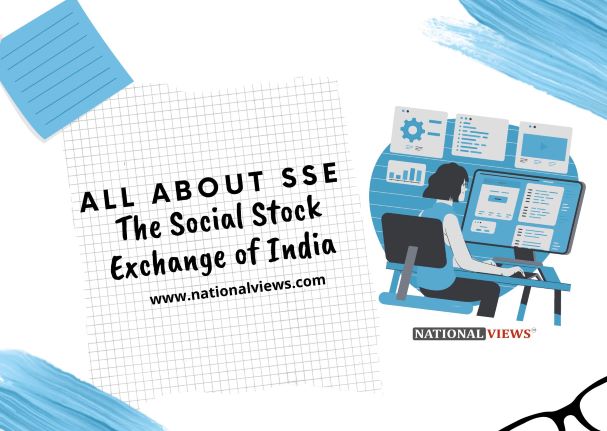After NSE and BSE, there comes a new stock exchange in India – SSE. Well, SSE, or the Social Stock Exchange is an innovative concept introduced by the National Stock Exchange (NSE) in India and is quite different from NSE and BSE, both. Here, in this article, we will provide an in-depth understanding of the Social Stock Exchange of India, including what it is, who is eligible to list on it, and what benefits investors can expect from the exchange.
What Is SSE, the Social Stock Exchange of India?
The Social Stock Exchange (SSE) is a unique concept that aims to provide an alternative fund-raising mechanism for social enterprises in India. It is a segment of the National Stock Exchange (NSE), which was approved by the Securities and Exchange Board of India (SEBI) in 2019. The SSE is designed to act as a medium between social enterprises and fund providers, enabling the former to raise funds from the public through the stock exchange mechanism.
Social enterprises are commercial enterprises that have a primary goal of addressing a social or environmental issue, rather than maximizing profits for shareholders. SSE identifies social enterprises as those organizations that engage in creating a positive impact in society. They can be either not-for-profit organizations or for-profit social enterprises. NPOs are set up as charitable associations and work for the welfare of society, while for-profit social enterprises operate with a view to generating profits alongside achieving their social objectives.
What are the Aims and Objectives of Indian SSE?
The SSE aims to offer an alternative fundraising instrument for social enterprises, enabling them to achieve their objectives of creating a positive social impact while also raising capital. In the wake of the COVID-19 pandemic, which has highlighted the urgent need for social capital for enterprises and voluntary organizations working for social welfare, the exchange will enable investors to support social causes while also earning returns on their investments. (Check out the Framework of SSE by SEBI)
Who All Are Eligible to List in SSE? Which Companies Can Get Listed in SSE?
As per the NSE guidelines, both not-for-profit organizations and for-profit social enterprises can register on the SSE. Here are the conditions that must be met for each:
NOT-FOR-PROFIT ORGANIZATIONS:
- A trust that is registered under the public trust law of the corresponding state and has a charitable purpose.
- A society that is registered under the Societies Registration Act, 1860 (21 of 1860) and has a charitable objective.
- A company that is incorporated under section 8 of the Companies Act, 2013 (18 of 2013) and has a not-for-profit purpose.
- SEBI may specify other entities besides the ones mentioned earlier as eligible for listing on the SSE.
FOR-PROFIT SOCIAL ENTERPRISES:
- To be eligible for listing on the SSE, a for-profit organization must be a profit-making company under the Companies Act, 2013, and should not fall under the purview of section 8 of the same act.
- A body corporate that is operating for profit
The SSE has certain requirements that a social enterprise must meet to be listed on the exchange. For instance, it must have been in existence for at least three years, and it must have audited financial statements for the past three years.
Additionally, the social enterprise must meet the minimum net worth criteria specified by SEBI and should be engaged in social activity out of 16 broad activities
- eradicating malnutrition, poverty, hunger
- supporting education, employability and livelihoods
- promoting healthcare
- gender equality – empowering women and LGBTQ+ Communities
- supporting incubators for social enterprises
Who All are Not Eligible for SSE? Which Organizations Cannot List in Indian Social Stock Exchange?
- Political or Religious Organization
- Corporate Foundations
- Professional or Trade Associations
- Infra companies
What are the Benefits of Investing in Social Enterprises Listed on SSE?
Investing in social enterprises listed on the Social Stock Exchange (SSE) has several benefits for investors. Here are three key benefits of investing in SSE:
1. Investment in Socially Responsible Companies
SSE provides investors with an opportunity to invest in socially responsible companies that are committed to creating a positive impact on society. Investing in SSE listed companies can provide investors with the satisfaction of investing in companies that are making a difference in the world. This may be particularly important to investors who are passionate about a specific social cause or who want their investments to align with their values.
2. Potential for Strong Returns
While social enterprises are primarily focused on creating a positive impact on society, investors can also benefit from the potential for strong returns. SSE provides investors with an opportunity to invest in companies that are making a difference and have a viable business model. Investing in SSE listed companies can provide investors with the potential for strong returns while also making a positive impact on society. It is important to note that, as with any investment, there are risks associated with investing in SSE listed companies.
3. Tax Benefits
Investing in SSE listed companies can provide investors with tax benefits. Under Section 80G of the Income Tax Act, taxpayers are allowed to claim a deduction for contributions made to certain relief funds and charitable institutions. SSE listed social enterprises are eligible for this deduction, providing investors with an additional benefit. While tax benefits should not be the main motivation for investing in SSE, they can serve as an extra incentive for investors who are interested in making a positive impact on society.
Final Note
In conclusion, Social Stock Exchange of India (SSE) is a novel concept that provides an alternative funding mechanism for social enterprises engaged in creating a positive impact on society. SSE allows eligible organizations to list on the stock exchange and provides investors with an opportunity to invest in socially responsible projects. With the potential tax benefits and transparency in social impact reporting, SSE is a win-win for both investors and social enterprises.


